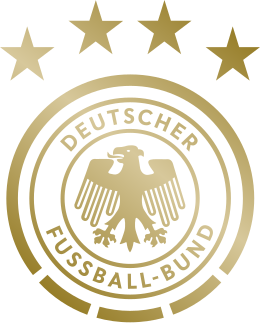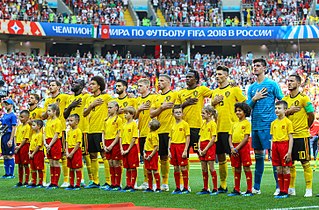
The FIFA World Cup, often simply called the World Cup, is an international association football competition contested by the senior men's national teams of the members of the Fédération Internationale de Football Association (FIFA), the sport's global governing body. The championship has been awarded every four years since the inaugural tournament in 1930, except in 1942 and 1946 when it was not held because of the Second World War. The current champions are France, who won their second title at the 2018 tournament in Russia.
{{Infobox national football team | Name = Brazil | Badge = Brazilian Football Confederation logo.svg | Badge_size = 170px | FIFA Trigramme = BRA | Nickname = A Seleção
Canarinho | Association = Confederação Brasileira de Futebol (CBF) | Confederation = CONMEBOL | Coach = Tite | Captain =Thiago Silva | Most caps = Cafu (142) | Top scorer = Pelé (77) | FIFA Rank = 1 | FIFA max = 1 | FIFA max year = 159 times on 8 occasions | FIFA min = 22 | FIFA min date = 6 June 2013 | Elo Rank = 1 | Elo max = 1 | Elo max year = 8,640 days on 40 occasions | Elo min = 20 | Elo min date = 7 November 2001 | Home Stadium = Various | pattern_la1 = _bra22h | pattern_b1 = _bra22h | pattern_ra1 = _bra22h | pattern_sh1 = _bra22h | pattern_so1 = _bra22hl | leftarm1 = FFCC00 | body1 = FFCC00 | rightarm1 = FFCC00 | shorts1 = 003CFF | socks1 = FFFFFF | pattern_la2 = _bra22a | pattern_b2 = _bra22a | pattern_ra2 = _bra22a | pattern_sh2 = _bra22a | pattern_so2 = _bra22al | leftarm2 = 0000FF | body2 = 0000FF | rightarm2 = 0000FF | shorts2 = FFFFFF | socks2 = 0000FF | First game = Argentina 3–0 Brazil
(Buenos Aires, Argentina; 20 September 1914) | Largest win = Brazil 10–1 Bolivia
(São Paulo, Brazil; 10 April 1949)
Brazil 9–0 Colombia
(Lima, Peru; 24 March 1957) | Largest loss = Uruguay 6–0 Brazil
(Viña del Mar, Chile; 18 September 1920)
Brazil 1–7 Germany
(Belo Horizonte, Brazil; 8 July 2014) | World cup apps = 22 | World cup first = 1930 | World cup best = Champions | Confederations cup apps = 7 | Confederations cup first = 1997 | Confederations cup best = Champions | Regional name = Copa América | Regional cup apps = 37 | Regional cup first = 1916 | Regional cup best = Champions | 2ndRegional name = Panamerican Championship | 2ndRegional cup apps = 3 | 2ndRegional cup first = 1952 | 2ndRegional cup best = Champions | medaltemplates = |- ! Olympic Games |- | | 2020 tokyo Olympics|Team

The 1990 FIFA World Cup was the 14th FIFA World Cup, a quadrennial football tournament for men's senior national teams. It was held from 8 June to 8 July 1990 in Italy, the second country to host the event for a second time. Teams representing 116 national football associations entered and qualification began in April 1988. 22 teams qualified from this process, along with host nation Italy and defending champions Argentina.

The Germany national football team represents Germany in men's international football and played its first match in 1908. The team is governed by the German Football Association, founded in 1900. Between 1949 and 1990, separate German national teams were recognised by FIFA due to Allied occupation and division: the DFB's team representing the Federal Republic of Germany, the Saarland team representing the Saar Protectorate (1950–1956) and the East Germany team representing the German Democratic Republic (1952–1990). The latter two were absorbed along with their records; the present team represents the reunified Federal Republic. The official name and code "Germany FR (FRG)" was shortened to "Germany (GER)" following reunification in 1990.

The Argentina national football team represents Argentina in men's international football and is administered by the Argentine Football Association, the governing body for football in Argentina.

The South Korea national football team represents South Korea in men's international football and is governed by the Korea Football Association. South Korea has developed and emerged as a major football power in Asia since the 1980s and is historically the most successful Asian football team, having participated in ten consecutive and eleven overall FIFA World Cup tournaments, the most for any Asian country. Despite initially going through five World Cup tournaments without winning a match, South Korea became the only Asian team to reach the semi-final stages when they co-hosted the 2002 tournament with Japan. South Korea also won two AFC Asian Cup titles, and finished as runners-up on four occasions. Furthermore, the team won three gold medals and three silver medals at the senior Asian Games.
The FIFA World Cup was first held in 1930, when FIFA, the world's football governing body, decided to stage an international men's football tournament under the era of FIFA president Jules Rimet who put this idea into place. The inaugural edition, held in 1930, was contested as a final tournament of only thirteen teams invited by the organization. Since then, the World Cup has experienced successive expansions and format remodeling, with its current 32-team final tournament preceded by a two-year qualifying process, involving over 200 teams from around the world.

This article summarizes the results and overall performance of Brazil at the FIFA World Cup not true the qualification phase and the final phase, officially called the World Cup Finals. The qualification phase, which currently takes place over the three years preceding the Finals, is used to determine which teams qualify for the Finals. The current format of the Finals involves 32 teams competing for the title, at venues within the host nation over a period of about a month. The World Cup Finals is the most widely viewed sporting event in the world, with an estimated over 1 billion people watching the 2014 tournament final.

This is a record of Argentina's results at the FIFA World Cup. Argentina is one of the most successful national football teams in the world, having won two World Cups in 1978 and 1986. Argentina has been runners up three times: in 1930, 1990 and 2014. In 19 World Cup tournaments, Argentina had 47 victories in 82 matches. The team was present in all but four of the World Cups, being behind only Brazil and Germany in number of appearances.
This is a list of Brazil national football team's all kinds of competitive records.

Association football is the most popular sport in nearly every African country, and thirteen members of the Confederation of African Football (CAF) have competed at the sport's biggest event – the men's FIFA World Cup.

This is a record of Germany and West Germany's results at the FIFA World Cup. The FIFA World Cup, sometimes called the Football World Cup, but usually referred to simply as the World Cup, is an international association football competition contested by the men's national teams of the members of FIFA, the sport's global governing body.

Belgium have appeared in the finals tournament of the FIFA World Cup on 14 occasions, the first being at the first FIFA World Cup in 1930 where they finished in 11th place. The inaugural FIFA World Cup final was officiated by Belgian referee John Langenus.
This article lists various team and individual football records in relation to the Belgian national football team. The page currently shows the records as of 23 November 2022.









